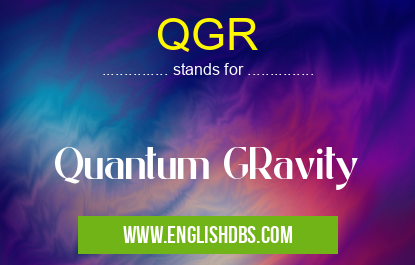What does QGR mean in PHYSICS
QGR stands for Quantum Gravity - a field of study devoted to the unification of quantum mechanics and general relativity. It investigates the nature of gravity at its deepest level, using principles from both theories in order to understand why our Universe works the way it does. By reconciling quantum mechanics, which describes how particles interact on an atomic scale, with general relativity, which describes gravity on a cosmic scale, QGR seeks to understand some of the most mysterious and fundamental questions about our Universe. Ultimately, this may lead to uncovering secrets about dark matter and energy — mysterious phenomena that remain largely unexplained.

QGR meaning in Physics in Academic & Science
QGR mostly used in an acronym Physics in Category Academic & Science that means Quantum GRavity
Shorthand: QGR,
Full Form: Quantum GRavity
For more information of "Quantum GRavity", see the section below.
Description
Quantum gravity attempts to address many of the unresolved issues associated with current theories on the fundamental structure of space and time. It seeks to unify two set of laws that were derived independently from one another: those governing particle physics and cosmology. This merging process not only addresses core problems in Einstein's theory such as singularities and black holes, but also adds valuable insight into topics like dark energy and dark matter — invisible forms of matter and energy that are believed to make up 95% of our universe — as well as inflationary models that describe why certain regions appear so homogenous compared to others.
Essential Questions and Answers on Quantum GRavity in "SCIENCE»PHYSICS"
What is Quantum Gravity?
Quantum gravity is a field of physics that seeks to unify the theory of quantum mechanics with general relativity. It attempts to describe and reconcile the behavior of matter and energy on very small scales with the laws of gravity as described by general relativity, in particular at very large or cosmological scales.
How does quantum gravity differ from classical gravity?
While classical gravity theory deals with large objects, like planets and stars, quantum gravity deals with extremely tiny particles. On this scale, particles behave differently than they do according to classical Newtonian physics. These differences include an effect called entanglement, which describes how two particles interact even when separated by significant distances.
What are some applications of quantum gravity?
Quantum gravity has implications for many areas of physics like cosmology and astrophysics, where it can help us understand phenomena such as dark matter and dark energy as well as black holes. Moreover, it also has potential applications to particle physics and condensed matter systems such as superconductors.
Are there any experiments that study quantum gravity?
Yes! Experiments have been conducted to try to measure gravitational interactions between entangled particles, although none have been conclusive yet. Researchers are also studying modified theories of gravity that could explain a number of cosmological observations better than standard general relativity or its extensions.
Does quantum gravity contradict Einstein's Theory of Relativity?
Not necessarily! Some interpretations of quantum mechanics suggest that space-time may not be continuous but consists of discrete points - something known as “spacetime foam†- which could be reconciled with General Relativity by incorporating principles from both theories into a single framework known as Quantum Gravity.
How does one go about testing a theory on quantum gravity?
This is done by performing experiments which can confirm or reject predictions made by these theories; researchers also look at astronomical data collected by telescopes which may support or refute claims made by certain models. Moreover, computer simulations can help simulate conditions under which a model would work best and provide valuable feedback when designing experiments.
Is there much research being done on the topic right now?
Yes! There is much ongoing research into different aspects related to quantum gravity including string theory, loop models and other related topics. Many researchers believe that unifying our understanding of gravitation with our understanding of subatomic particles will lead us further towards uncovering the mysteries behind our universe.
What do scientists hope to gain from studying quantum gravity? A: By researching this subject further we are hoping to gain deeper insights into how space-time works at incredibly small scales; this could potentially lead us towards unlocking new energy sources or uncovering new forces in nature besides gravitation itself. Additionally this might eventually shed light on otherwise hidden physical processes taking place within black holes & cosmology in general.[END] Q: Is there evidence for any specific type of quantum theory being correct? A: Not yet; many promising approaches exist such as string theory & loop models but more experimentation & research is necessary before any definitive answers can be reached regarding their validity & practicality.[END] Q: Are there technological applications currently being developed using principles from this field?
By researching this subject further we are hoping to gain deeper insights into how space-time works at incredibly small scales; this could potentially lead us towards unlocking new energy sources or uncovering new forces in nature besides gravitation itself. Additionally this might eventually shed light on otherwise hidden physical processes taking place within black holes & cosmology in general.
Final Words:
Quantum Gravity is a complex but promising new area of research that has revealed exciting new insights into the structure of our universe. With further exploration, we could gain greater understanding into some of its most enigmatic mysteries such as dark matter and energy, or even come closer to answers regarding its origin and ultimate fate. At its heart lies an effort to reconcile two powerful theories — quantum mechanics and general relativity — in hopes that they may provide further explanations to the complex workings behind our universe's grand design.
